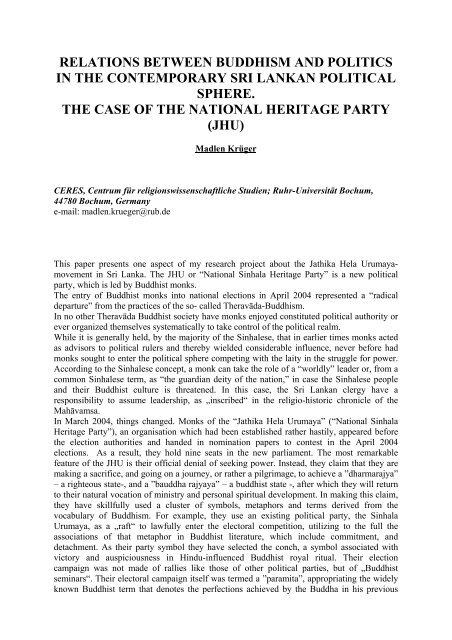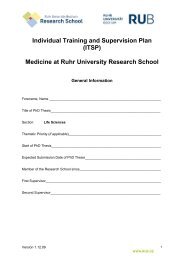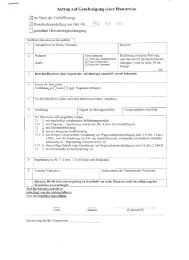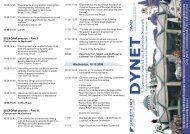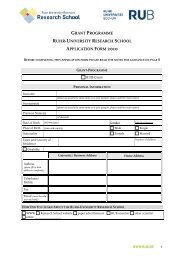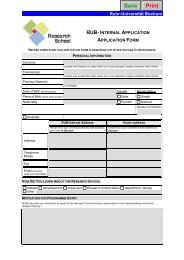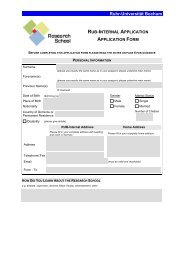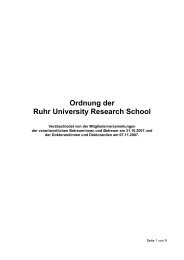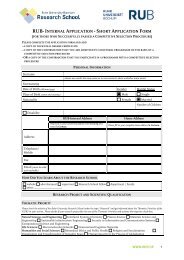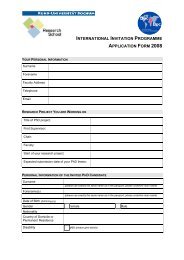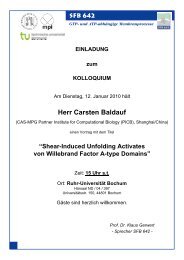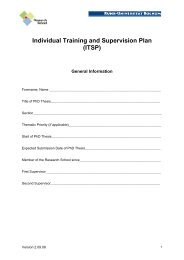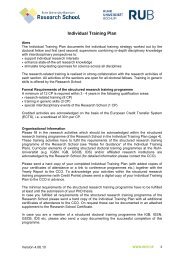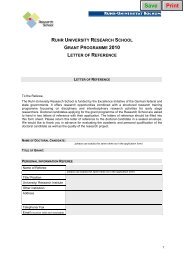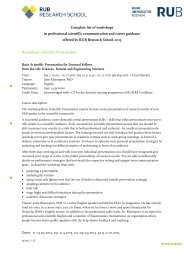Section Days abstract book 2010.indd - RUB Research School ...
Section Days abstract book 2010.indd - RUB Research School ...
Section Days abstract book 2010.indd - RUB Research School ...
You also want an ePaper? Increase the reach of your titles
YUMPU automatically turns print PDFs into web optimized ePapers that Google loves.
RELATIONS BETWEEN BUDDHISM AND POLITICS<br />
IN THE CONTEMPORARY SRI LANKAN POLITICAL<br />
SPHERE.<br />
THE CASE OF THE NATIONAL HERITAGE PARTY<br />
(JHU)<br />
Madlen Krüger<br />
CERES, Centrum für religionswissenschaftliche Studien; Ruhr-Universität Bochum,<br />
44780 Bochum, Germany<br />
e-mail: madlen.krueger@rub.de<br />
This paper presents one aspect of my research project about the Jathika Hela Urumayamovement<br />
in Sri Lanka. The JHU or “National Sinhala Heritage Party” is a new political<br />
party, which is led by Buddhist monks.<br />
The entry of Buddhist monks into national elections in April 2004 represented a “radical<br />
departure” from the practices of the so- called Theravāda-Buddhism.<br />
In no other Theravāda Buddhist society have monks enjoyed constituted political authority or<br />
ever organized themselves systematically to take control of the political realm.<br />
While it is generally held, by the majority of the Sinhalese, that in earlier times monks acted<br />
as advisors to political rulers and thereby wielded considerable influence, never before had<br />
monks sought to enter the political sphere competing with the laity in the struggle for power.<br />
According to the Sinhalese concept, a monk can take the role of a “worldly” leader or, from a<br />
common Sinhalese term, as “the guardian deity of the nation,” in case the Sinhalese people<br />
and their Buddhist culture is threatened. In this case, the Sri Lankan clergy have a<br />
responsibility to assume leadership, as „inscribed“ in the religio-historic chronicle of the<br />
Mahāvamsa.<br />
In March 2004, things changed. Monks of the “Jathika Hela Urumaya” (“National Sinhala<br />
Heritage Party”), an organisation which had been established rather hastily, appeared before<br />
the election authorities and handed in nomination papers to contest in the April 2004<br />
elections. As a result, they hold nine seats in the new parliament. The most remarkable<br />
feature of the JHU is their official denial of seeking power. Instead, they claim that they are<br />
making a sacrifice, and going on a journey, or rather a pilgrimage, to achieve a ”dharmarajya”<br />
– a righteous state-, and a ”bauddha rajyaya” – a buddhist state -, after which they will return<br />
to their natural vocation of ministry and personal spiritual development. In making this claim,<br />
they have skillfully used a cluster of symbols, metaphors and terms derived from the<br />
vocabulary of Buddhism. For example, they use an existing political party, the Sinhala<br />
Urumaya, as a „raft“ to lawfully enter the electoral competition, utilizing to the full the<br />
associations of that metaphor in Buddhist literature, which include commitment, and<br />
detachment. As their party symbol they have selected the conch, a symbol associated with<br />
victory and auspiciousness in Hindu-influenced Buddhist royal ritual. Their election<br />
campaign was not made of rallies like those of other political parties, but of „Buddhist<br />
seminars“. Their electoral campaign itself was termed a ”paramita”, appropriating the widely<br />
known Buddhist term that denotes the perfections achieved by the Buddha in his previous


